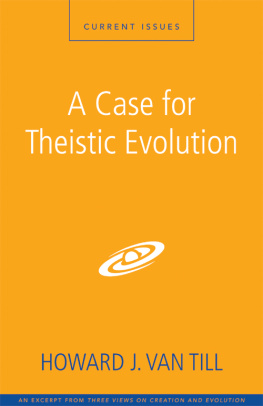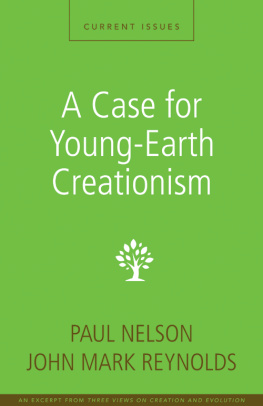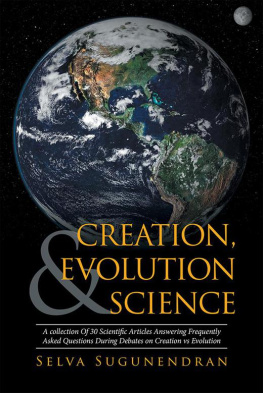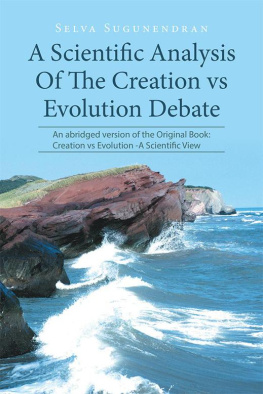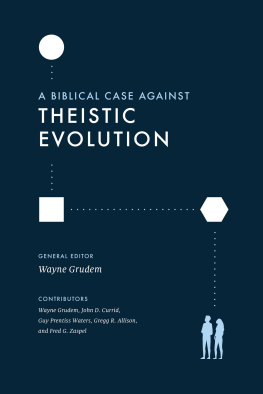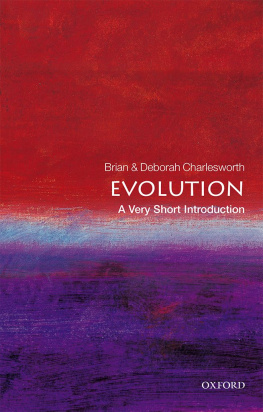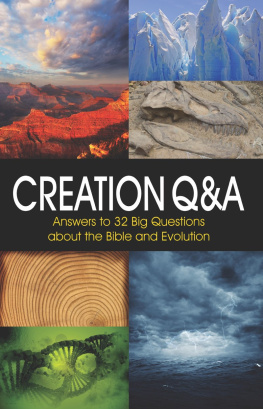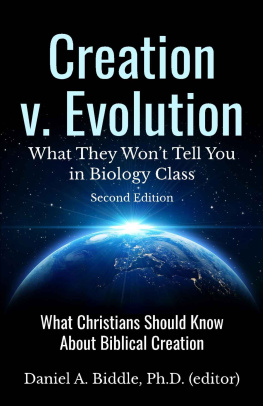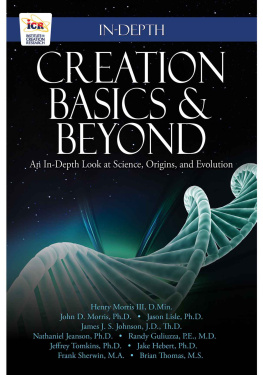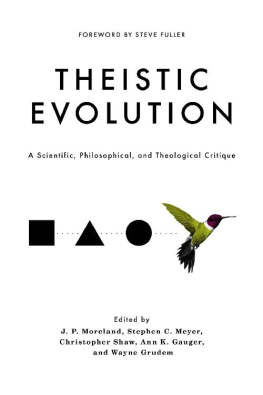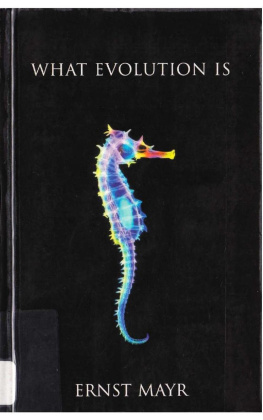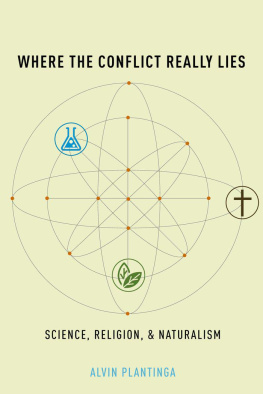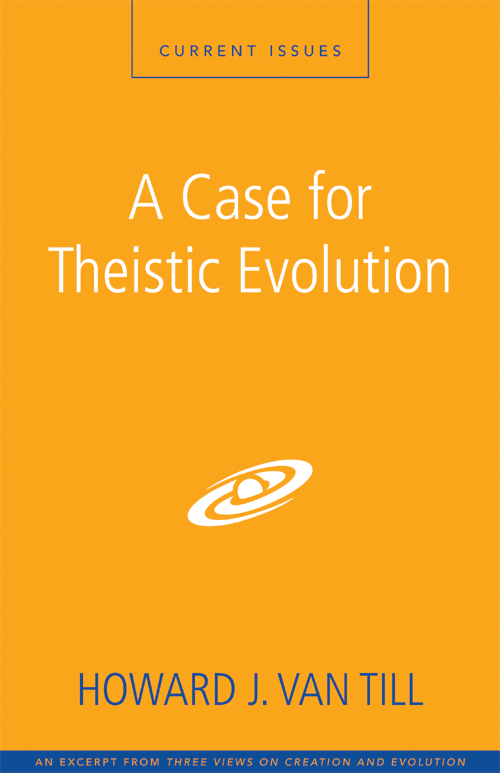Zondervan
A Case for Theistic Evolution
Previously published in Three Views on Creation and Evolution
Copyright 1999 by J. P. Moreland and John Mark Reynolds
All rights reserved under International and Pan-American Copyright Conventions. By payment of the required fees, you have been granted the non-exclusive, non-transferable right to access and read the text of this e-book on-screen. No part of this text may be reproduced, transmitted, downloaded, decompiled, reverse engineered, or stored in or introduced into any information storage and retrieval system, in any form or by any means, whether electronic or mechanical, now known or hereinafter invented, without the express written permission of Zondervan.
EPub Edition JANUARY 2012 ISBN: 978-0-310-49650-2
Requests for information should be addressed to:
Zondervan, Grand Rapids, Michigan 49530
The Library of Congress has cataloged the original edition as follows:
Three views on creation and evolution / J. P. Moreland and John Mark
Reynolds, general editors; contributors, Paul Nelson[et al.]; respondents,
John Jefferson Davis[et al.]., First.
p. cm.(Counterpoints)
Includes bibliographical references and index.
ISBN 0-310-22017-3
1. Creationism. 2. EvolutionReligious aspectsChristianity. I. Moreland, James Porter, 1948-. II. Reynolds, John Mark, 1963-. III. Nelson, Paul. IV. Davis, John Jefferson. V. Series: Counterpoints (Grand Rapids, Mich.)
BS651. T485 1999
231.7652dc21
98-33239
All Scripture quotations, unless otherwise indicated, are taken from the Holy Bible: New International Version. NIV. Copyright 1973, 1978, 1984 by International Bible Society. Used by permission of Zondervan. All rights reserved.
Any Internet addresses (websites, blogs, etc.) and telephone numbers in this book are offered as a resource. They are not intended in any way to be or imply an endorsement by Zondervan, nor does Zondervan vouch for the content of these sites and numbers for the life of this book.
All rights reserved. No part of this publication may be reproduced, stored in a retrieval system, or transmitted in any form or by any meanselectronic, mechanical, photocopy, recording, or any otherexcept for brief quotations in printed reviews, without the prior permission of the publisher.
Cover design: Ron Huizinga
Theistic Evolution
Howard J. Van Till
1. OVERALL POSITION
Personal Position on the Creation-Evolution Controversy
The Beginning of an Answer. To be very candid, I think that the creation-evolution controversy among Christians is the outgrowth of a serious misunderstanding both of the historic Christian doctrine of creation and the scientific concept of evolutionary development. I would even be so bold as to add that the misunderstanding of the historic doctrine of creation may be as widespread within the Christian community as it is outside of it, and that the misunderstanding of the scientific concept of evolution may be as widespread within the scientific community as it is outside of it. If this assessment is correct, then the controversy constitutes a regrettable mistake that must be repaired if the Christian church wishes to be effective in its presentation of the Gospel to a scientifically knowledgeable world in the centuries to come.
Nonetheless, although flawed concepts both of creation and evolution may be the source of the problem, here we are, engaged in a controversy that continues to cause a division of the Christian community into several camps, each of which is tempted to see itself as superioreither spiritually or intellectuallyto all other camps. The fundamental questions at issue concern the character of divine creative activity and the nature of the creation that is the outcome of Gods creative action.
What is the best vocabulary to employ in our speech about Gods creative work? Is Gods creative action best described in a vocabulary that places especial emphasis on episodes of miraculous intervention in which God is believed to have imposed new forms on the raw materials that he made in the beginning? Or is it better described in a vocabulary that emphasizes Gods giving of being to a creation that is richly gifted with the capabilities to organize and transform itself into new forms in the course of time? Is the creation in fact gifted with all of the capabilities necessary to make possible the continuous evolutionary development envisioned by the majority of natural scientists today? Or has the scientific community committed a massive interpretive blunder, and should Christians expect, therefore, that a reexamination of the observational evidence will convincingly discredit the scientific concept of evolution?
I need to spell out the working definitions of several important terms that I will use throughout this essay. I have often described the creation-evolution controversy as a shouting match that generates more heat than lightmore hostility than learning. One of the reasons for this unhappy state of affairs is the frequent failure of participants to identify the fundamental questions or to provide clear definitions of key terms.
The Larger Context of the Question. It should be self-evident that the creation-evolution controversy within the Christian community cannot be isolated from the creation-evolution debate between one camp of Christians and another camp of persons claiming to represent the scientific community. To a large number of people, both within and outside of the Christian community, it apparently makes sense to engage in a debate in which a person must choose either creation or evolution. Of course, faithful Christians would be expected to choose creation, and anyone who chose evolution would be presumed to stand outside of the Christian community, at least outside of the authentic and faithful portion of it.
The either/or format of the creation-evolution debate is, I believe, one of the most effective factors that has made the discussion of creation and evolution so controversial within the Christian community. If a Christian has been taught that there are only two fundamental perspectives on how the universe got to be as it now iscreation and evolutionand if he or she is forced to choose between them, how then could a faithful Christian find any credibility in the concept of evolutionary development?
But there are many Christians, especially those of us who are trained in the natural sciences, who feel strongly called to offer a perspective very different from either of the two views ordinarily presented. For me, a Christian who was privileged to be born into a denominational community with a rich theological heritage, this sense of calling arises out of a deep desire to maintain both Christian faithfulness and intellectual integrity. I was taught that maintaining both is not only possible, but also what God desires from me. Here I will present a view in which the Christian doctrine of creation and the scientific concept of evolution are not at all in conflict so that a choice between them becomes unnecessary. In fact, the very idea of an either/or choice between creation and evolution will be seen as wholly inappropriate.
But if you are a person who has been trained to think of creation and evolution as being labels for concepts that stand in radical opposition to each other, the goal of reconciling the two probably looks profoundly impossible. By the end of this discussion, however, I hope that you will see that reaching this goal is not only possible, but immensely worthwhile. Achieving this goal, however, will require some very careful thought. Complex issues demand thoughtful analysis. One aspect of careful thought that will be essential to us is the establishing of a high respect for the precise meanings of important words that will be employed. So, be prepared for a number of carefully stated definitions.

